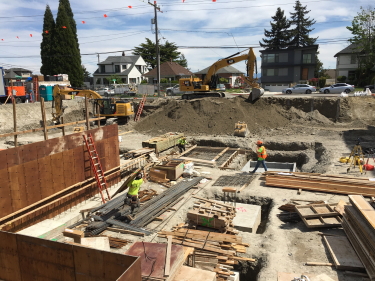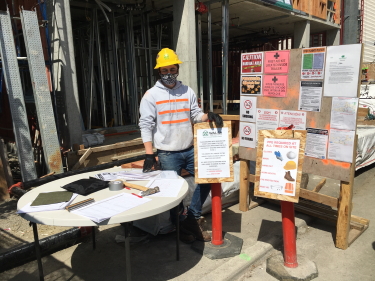|
Subscribe / Renew |
|
|
Contact Us |
|
| ► Subscribe to our Free Weekly Newsletter | |
| home | Welcome, sign in or click here to subscribe. | login |
Construction
| |
May 5, 2020
Here's what Walsh learned after 2 months of COVID jobsite rules
Journal Construction Editor
Life is starting to get back to normal — rather a new normal — on some construction sites across Washington following Gov. Jay Inslee's recent lifting of a moratorium on projects where workers can maintain 6 feet of social distance.
Contractors restarting construction must follow a 30-step plan put together by an industry roundtable that focuses on the COVID-19 pandemic's impact on jobsites. They also might want to study how Walsh Construction has fared over the past two months. Northwest-based Walsh was an early adapter of coronavirus procedures as it continued to work on several essential projects in Washington and Oregon.
Elizabeth Rinehart, vice president and general manager of Walsh's Washington operations, said her company has six local affordable housing projects deemed “essential” that continued during the moratorium and three that were shut down. Those three projects restarted last week and two of the ongoing projects were finished, including an affordable housing building and an emergency seismic repair to an old garage.
Rinehart said Walsh developed its original COVID-19 response on March 11, and updated it in April and again last week in response to the 30-step plan.
“Our COVID response plan has had to evolve quickly as information comes out,” she said.
Walsh basically follows COVID-19 requirements set by King County, the state and the Centers for Disease Control and Prevention. Rinehart said they didn't create their own base rules because the government regulations were changing so quickly.
Walsh also made some updates to its plan after reviewing response plans later produced by the Associated General Contractors of Washington, Associated Builders and Contractors of Western Washington, and the Master Builders Association of King and Snohomish Counties.
Additionally, the company formed COVID-19 response teams, one in Washington and one in Oregon, that meet every morning to discuss concerns and the latest information on the disease.
Here are a few details of Walsh's COVID-19 site management plan:
• Everyone works together to create a safe work environment.
• Sick workers must stay home.
• Employees and dependents can have their symptoms evaluated using telehealth.
• Each employee has a choice to work on-site.
• Social distancing must be followed, including suppliers, visitors and subcontractors.
• Frequent hand washing and cleaning of high-touch locations, both at home and on the job.
• A limited number of people in a trailer at any time.
• Only two people can ride in an elevator/lift at any time.
• Hold critical meetings outside or have multiple sessions with fewer people in each session.
• Use Webex for some meetings.
• Each site has a separate outbuilding for check-in and check-out of all personnel.
Rinehart said all workers must wear face masks, eye protection and gloves, and starting last week must have their temperatures taken as they enter the jobsite. For larger jobsites, Walsh hired temporary medical labor company Medix to conduct temperature checks. On smaller jobs, Walsh is handling that in-house with no-touch thermometers.
Rinehart said constant coronavirus rule changes have been the most difficult thing to deal with on jobsites. She said they have been following CDC guidelines since the beginning, but have had to deal with different regulations between Oregon and Washington and the various cities Walsh builds in. She said there have been no conflicts, just a lot of requirements to track.
Some social distancing has been easy to control, such as not allowing workers to eat lunch together. Other social distancing has been more difficult, such as certain jobsite tasks that require more than one worker.
“Do you make hallways one-way or stairways one-way up and down?” Rinehart asked.
To increase social distancing, Walsh has reduced the number of people on jobsites and is working in staggered shifts. Rinehart said some workers come in at 6 a.m. while others come in at 8 a.m. Architects needing to visit sites have been showing up late in the afternoon, after construction crews have left.
All this social distancing has affected productivity: Rinehart said schedules could be pushed by 10% to 20%, depending on how long restrictive regulations last.
Walsh has recorded only one case of COVID-19 infection, a worker at the Providence Delores House renovation project in Seattle's Crown Hill neighborhood. This project was shut down for 14 days and a company was hired to disinfect the jobsite. No one else on the site was infected.
Rinehart said a handful of employees have stayed off jobsites in fear of COVID-19 and the company is encouraging those that don't need to be on jobsites to work from home. She said no one has been sent home for violating the new rules, which give supervisors the power to do that or write warnings.
The outbreak has also led to concerns about getting supplies. Rinehart said they haven't had any supply issues that have stopped a project yet, but have found it difficult to get personal protective equipment.
In March, one of Walsh's affordable housing projects was in the middle of framing operations when a joist supplier in Oregon shut down its production line to comply with early coronavirus rules. Rinehart said they talked with the supplier, which then enlisted some of its office staff to work in the factory to finish the joist order.
Walsh finished four affordable housing projects in the last three months to create 380 housing units. Rinehart said projects like the recently opened 105-unit Bob and Marcia Almquist Place that Walsh built in Seattle's Chinatown-International District help get people off the streets, where it is harder to control the spread of COVID-19.
Walsh is gearing up to start additional affordable housing: the 250-unit Cedar Crossing project will start May 18 next to the Roosevelt light rail station; and the 105-unit Othello Park project will start June 3 near the Othello light rail station. Cedar Crossing is being developed by Bellwether Housing and Mercy Housing, and includes ground floor retail and a day care. Othello Park is being developed by the Low Income Housing Institute.
Rinehart said the construction industry is well-tooled to handle the fallout from coronavirus. “Construction is inherently about problem solving ... that's what happens on jobsites every day,” she said.
Benjamin Minnick can be
reached by email or by phone
at (206) 622-8272.




